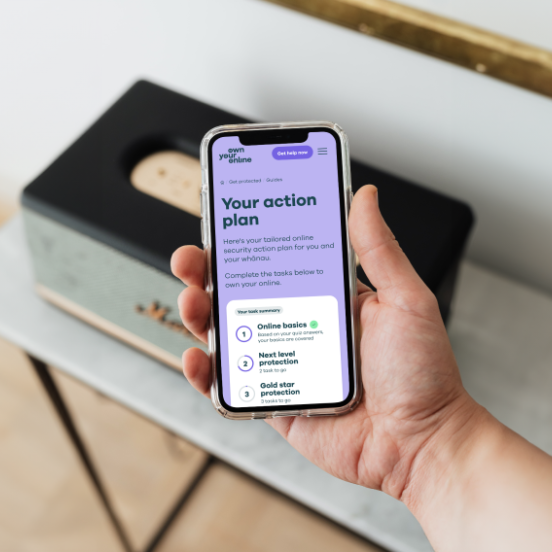Scams and fraud
Online scams are intended to manipulate or trick people into giving away their personal details, financial details, or money.
What are online scams?
Online scams are when someone tries to trick you into giving away your personal details, financial details, or money over the internet. A scam becomes
Lying for personal or financial gain.
How it works
While some scammers will just ask you for money directly, others will be less obvious. They’ll try to trick you into giving them personal information they can use to:
- get access to your finances
- steal your identity
- buy goods or services.
Common types of online scams
There are lots of different types of scams. Some of the most common ones we see are:
Phishing
Phishing is a type of email scam, where the sender pretends to be a trustworthy organisation – like a bank, government agency or shipping company – to try to get you to give them personal information, like the login details for your internet banking.
Protect yourself against phishing emails
Social media scams
Social media scams happen when someone tries to get money from you through an interaction on social media. They might pretend to be someone you know, and they'll ask you directly for money. For example, they’ll say that they need money to help them get home as they’re stuck somewhere with no access to funds, or that they need to pay for unexpected medical costs. Alternatively, they might be someone you're talking to about buying or selling something on a social media marketplace.
Learn about social media scams
Invoice scams
Invoice scams affect both individuals and businesses. Scammers will send fake invoices requesting payment for goods or services that you didn't ask for or receive. They often say that the due date for payment has passed, or that your credit rating will be affected if they’re not paid.
Protect yourself from invoice scams
Scam calls
While scam calls are not quite as common as they used to be, they do still happen so it's good to be aware of how they work. Scammers will call you at home pretending to be from a well-known company, like:
- a tech company like Microsoft, or
- a mobile phone provider, like One NZ.
They’ll ask you to give them remote access to your PC or
Your phone, tablet, or computer. A piece of software that helps you do something, usually on a mobile device. Short for 'application'.
Money and investment scams
This type of scam is common online. Scammers will attempt to get you to part with money or valuable information under the false assumption that you’ll receive financial or personal gain in return. These scams can include 'get rich quick' schemes like:
- the Nigerian prince scam
- ponzi schemes
- unexpected prizes, and
- fake auctions.
Learn more about investment scams
Protect against investment scams
Romance scams
In romance scams, scammers will try to take advantage of someone looking for a relationship online. Scammers will use dating sites and apps or social media to build a relationship with you. Once they’ve gained your trust, the scammer will start to ask you for money, gifts or personal details that can be used to commit fraud. They often use fake profiles to make it harder to track them down.
Learn more about romance scams
Protect yourself from romance scams
Text message scams
Text message scams (sometimes called 'smishing scams' or
text message. Short for 'Short Message Service'.
It's important to stay alert and watch out for the signs of a scam. You can check to see if a message or call you've received is likely to be a scam using our 'scam check' tool.
Scam check
How secure are you online?
Use our assessment tool to answer a few questions about your online security behaviour and habits. You will then get a customised action plan to work through to help you become more secure online.